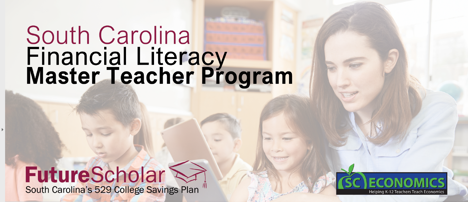Promoting Personal Finance Education Through Collaboration
By State Treasurer Curtis Loftis and Jim Morris, CEO of SC Economics
Personal finance education has never been more relevant than it is today in the COVID-19 era. The virus has disrupted the finances of many hard-working citizens and left them wondering how to navigate their economic obligations. But even before the arrival of the pandemic, studies had already shown that a lack of financial literacy has a detrimental impact on Americans. Without important knowledge about real-world topics such as loans, credit, taxes, and retirement, Americans can experience anxiety about money and often end up with growing debt that is difficult to overcome. Many states have attempted to respond to the need by incorporating personal finance into their education standards. However, close examination reveals this approach may not be enough.
While 45 states have at least included personal finance in their K-12 standards, only 21 of those actually require students to take a finance course. 15 of the 21 – including South Carolina – simply integrate personal finance into another course, such as social studies or math. The unfortunate result? Only six states truly require a comprehensive personal finance class before graduation.
As South Carolina schools begin implementing new personal finance academic standards, we know that preparing our educators to share these critical skills with our current generation of students is vitally important. That’s why, having worked together for many years to support K-12 financial literacy efforts throughout South Carolina, we saw the opportunity for a meaningful collaboration between the State Treasurer’s Office and SC Economics.
In January 2020, the State Treasurer’s Office, through its Future Scholar College Savings Plan, and SC Economics – a statewide non-profit dedicated to providing training, tools and resources for K-12 teachers in economic education and financial literacy – launched a program to bring personal finance education into classrooms.
 The South Carolina Financial Literacy Master Teacher Program is a bold, innovative initiative that aims to energize teachers about the importance of incorporating personal finance into their curriculum by providing not only financial incentives, but also tools and training since many do not feel equipped to teach these lessons. In fact, a study by the University of Wisconsin showed that more than 80% of teachers feel unprepared to teach personal finance. The S.C. Financial Literacy Master Teacher Program offers a unique solution that emphasizes educators’ personal professional growth while increasing their confidence to teach financial literacy content.
The South Carolina Financial Literacy Master Teacher Program is a bold, innovative initiative that aims to energize teachers about the importance of incorporating personal finance into their curriculum by providing not only financial incentives, but also tools and training since many do not feel equipped to teach these lessons. In fact, a study by the University of Wisconsin showed that more than 80% of teachers feel unprepared to teach personal finance. The S.C. Financial Literacy Master Teacher Program offers a unique solution that emphasizes educators’ personal professional growth while increasing their confidence to teach financial literacy content.
In addition to exhibiting a passion for personal finance education, educators selected to participate in this new program must pass the national W!SE Financial Literacy Certification exam, participate in financial literacy professional development, and lead their own financial literacy training workshops. Workshops allow them to share best practices and learning adaptations with other educators so that financial literacy lessons can be taught cross-curricular and at all grade levels across the state. Educators are compensated for their participation in these workshops. As teachers progress through the multi-year program at the Bronze, Silver and Gold levels of training, they receive more incentives for their work as they take on additional training and teaching requirements.
While still in its early stages, the program is already having a strong impact. Our first cohort, comprised of 36 educators, represented 36 different schools – 24 high schools, nine middle schools and three elementary schools – and 22 school districts. In the first six months, our small cohort of 36 trained an additional 320 teachers, reaching an estimated 32,000 students. Many of our “cohort one” teachers have committed to working toward receiving their Silver certification this school year, and we have already welcomed a new cohort of 39 educators who are starting the process of achieving their Bronze certification.
We recently adapted our training efforts to a virtual platform in order to continue to provide this vital financial literacy education in South Carolina for the foreseeable future. With its unique structure that emphasizes teacher training, we think the S.C. Financial Literacy Master Teacher Program will serve as a national model for other states to follow.
We are grateful to our teachers and the participating schools and districts that support them in their willingness to bring these vital lessons to the classroom. As South Carolina’s students head back to school this fall, we are excited to continue our efforts to bring them best-in-class financial education in hopes of improving their quality of life and their future financial health.
Curtis Loftis was elected State Treasurer in 2010. He serves as the state’s “private banker,” managing, investing and retaining custody of more than $50 billion in public funds. In addition, he administers Future Scholar, South Carolina’s 529 College Savings Plan, and serves on the South Carolina Financial Literacy Board of Trustees.
Jim Morris became the CEO of SC Economics in 2013. A West Point graduate, he enjoyed a distinguished 26-year career in the US Army, retiring as a Colonel in 2003 from Fort Benning, GA. Upon moving to Columbia, SC, he has served in several key positions that have benefited from his strategic planning, training and leadership development experience.






